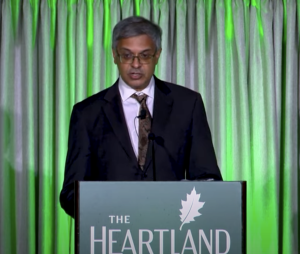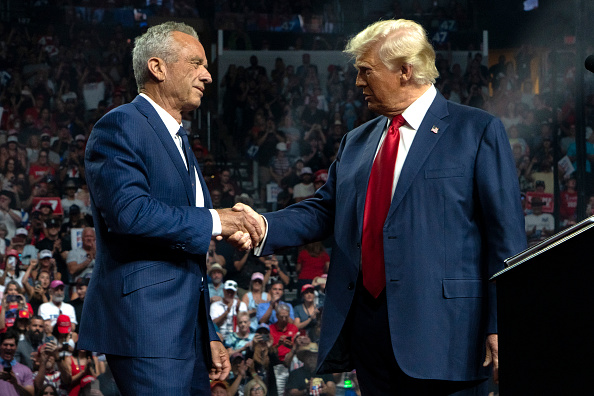President-elect Donald Trump will press for major reforms to the trillion-dollar U.S. health care industry, a series of provocative, high-profile health care leadership nominations indicates.
Trump’s nominee for Health and Human Services (HHS) secretary, Robert F. Kennedy Jr., is a staunch critic of big pharma, vaccine schedules, chemical food additives, and more. Martin Makary, M.D., nominated to head the U.S. Food and Drug Administration (FDA), is noted for his contrarian views on pandemic lockdown policies, especially while he held a prominent position at Johns Hopkins Medical School. Makary recently wrote the book Blind Spots, in which he criticized “groupthink” in health care.
Trump nominated Jay Bhattacharya, M.D., Ph.D., to head of the National Institutes of Health. Bhattacharya of Stanford University and author of The Great Barrington Declaration has not only been a leading voice against lockdown policies but also government-led censorship during the pandemic. Bhattacharya was a keynote speaker, discussing the “Silicon Curtain” at the benefit dinner of The Heartland Institute, which co-publishes Health Care News.

Former Congressman Dave Weldon, M.D. (R-FL), nominated to head the Centers for Disease Control and Prevention (CDC), has been a physician for 40 years and is an Army Veteran. Weldon served in leading roles on the Government Oversight and Reform Committee, dealing with HHS and the CDC. Weldon sponsored the Weldon Patent Ban which in 2011 permanently banned patents developed from human embryos.
A New Regime?
The Senate must confirm Kennedy, who is facing stiff opposition from big pharma and the likes of billionaire Michael Bloomberg, and Scott Gottlieb, Trump’s former FDA commissioner, Scott Gottlieb. If confirmed, Kennedy would be leading a massive well-entrenched bureaucracy that would administer policy in a sector, health care, that accounts for 17.3 percent of the gross domestic product.
Kennedy has spoken out on vaccines, drugs, and foods and would have the ability to reverse policies implemented under outgoing HHS Secretary Xavier Becerra. Becerra rankled conservatives on many fronts, championing “gender-affirming care,” broad abortion access including subsidization under Title X, and approval of the use of untested mRNA vaccines on children under an emergency authorization.
“I believe RFK will require HHS leaders and staff to take a look in the mirror and conduct a long-overdue and critical self-examination involving the performance of the CDC, FDA, NIH, and all other agencies reporting to HHS,” said Scott Jensen, M.D, a former member of the Minnesota State Senate and gubernatorial candidate.
“Millions of Americans have been astonished, distressed, and frightened by how our public-health leaders stumbled during the Covid pandemic,” said Jensen. “RFK will demand that a ruthless SWOT [strengths, weaknesses, opportunities, threats] analysis be carried out and short-, mid- and long-range strategies be devised to carry out the mission of the HHS.”
Change Not Easy
It will probably prove difficult for the new administration to make major changes, says Merrill Matthews, Ph.D., a resident scholar with the Institute for Policy Innovation.
“Immediate changes to policy will not likely be as radical as Kennedy and Trump would like,” said Matthews. “HHS is huge, with 60,000 permanent and 23,000 temporary employees, with 13 agencies administering 100 programs. As an outsider with no experience at HHS, just getting up to speed on what they all do will be a monumental task. Plus, [Kennedy] will likely face resistance to many of his recommendations.
“There also may be several court fights,” said Matthews. “So, while there is a lot of merging or eliminating that can be done, it’s likely to take a while.”
Expects Resistance
In a trillion-dollar sector of the economy, pushback against disruptive regulatory changes is likely, however necessary or beneficial they would be, says Matthews.
“The biggest areas of resistance are likely to be the ACA, Medicaid, and the NIH and its affiliates,” said Matthews. “Congress will almost certainly end the expanded subsidies going to ACA premiums, and CMS will look favorably on states imposing work requirements if Congress doesn’t impose them, so I expect progress there. As for the NIH, CDC, etc., I expect a full-blown roadblock.”
FDA Gap
The FDA will put up strong resistance to reforms Kennedy is likely to propose, says Matthews.
“Kennedy is a huge critic of pharmaceutical companies and a big proponent of therapies that are generally seen as unproven and even fringe, such as legalizing and expanding psychedelics,” said Matthews. “This gap between the Kennedy vision of health care and the traditionalists at the FDA is likely to create a great deal of tension. Of course, a lot of people in the various HHS agencies will likely quit, perhaps reducing internal opposition.”
Kennedy’s proposals will face a broad range of resistance, says Twila Brase, R.N., the co-founder and president of the Citizens Council for Health Care Freedom.
“It is not a matter of ability; it’s a matter of will,” said Brase. “If Kennedy does the right thing, the greatest resistance will come from the biggest players who are profiting at the expense of patients, taxpayers, and medical ethics: hospitals, health plans, big pharma, and big data—and likely a boatload of government bureaucrats under him. Their jobs, power, pensions, and purpose will be threatened.”
Kevin Stone (kevin.s.stone@gmail.com) writes from Arlington, Texas.





















